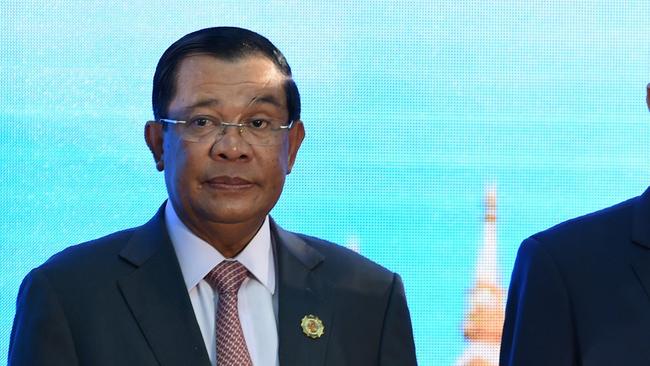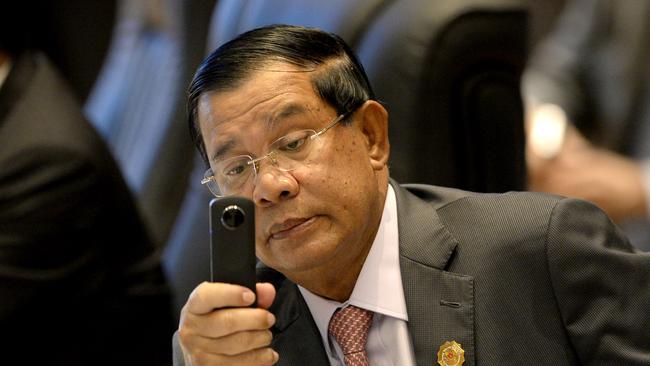Hun Sen threatens to ‘beat’ protesters outside ASEAN-Australia summit
Cambodia’s PM says he will ‘beat’ any protesters who burn his photo outside next month’s ASEAN-Australia Summit.

Cambodian Prime Minister Hun Sen has threatened to “beat” any protesters in Sydney who dare burn his image outside next month’s ASEAN-Australia Summit, and warned he would boycott the meeting if member states tried to “pressure” him.
“I would like to send a message, do not burn my photo. If you burn my photo, I will follow you home ... I will follow you and beat you at home,” the former Khmer Rouge fighter who has ruled Cambodia for 32 years said in a speech to Cambodian garment workers on Wednesday.
He also threatened to boycott the March 17 and 18 summit or veto any joint statements, referring to apparently wiretapped telephone calls made by Sam Rainsy, the exiled leader of the now-banned opposition Cambodia National Rescue Movement, in which he claimed the Cambodian government would face pressure from both the United Nations, Australia and ASEAN states.
“If there is no Hun Sen, there will be no ASEAN,” he told factory workers this week.
“I’ll just give the reason that in 2018 I cannot go abroad because I am busy with the election,” that is scheduled for July 29. “This means Australia won’t be able to hold the meeting. If there is no consensus it is impossible.”
Political analyst Lao Mong Hay told the Phnom Penh Post that Hun Sen had been “very angry” when previously met with protesters abroad and was likely using threats to pre-empt demonstrations and to avoid losing “a lot of face”.

But Human Rights Watch has condemned the comments and called on Malcolm Turnbull to “draw a line in the sand” and demand Hun Sen retract the threats or have his invitation withdrawn.
“Hun Sen is openly threatening violence against protesters in Australia,” HRW Australia director Elaine Pearson said.
“Turnbull has to draw a line in the sand and make it crystal clear that Hun Sen has no business threatening protesters on Australian soil and that the government does not tolerate harassing or intimidating protesters.
Ms Pearson said Australia recently did the ‘right thing” in accepting the family of slain political activist Kem Ley as asylum-seekers. The family arrived in Australia this week.
But she added; “It would be horrific if, after his Sydney visit, Hun Sen took action against the families of protesters. It’s clear what Hun Sen gets out of the Sydney trip _ showing he has Western support ahead of national elections despite his campaign of repression at home. But it’s not clear what Australia gets out of it besides headaches and the possibility of further reprisals.
“It’s time for Turnbull to urge Hun Sen to retract those remarks or uninvite him to the ASEAN summit.”
Cambodia’s democratic regression is being watched with increasing concern by the international community. This month The Economist Intelligence Unit democracy index downgraded from a “hybrid regimen” to an authoritarian one.
This week Cambodia’s parliament unanimously adopted new draconian lese majeste laws that punish any insults to the monarchy with up to five years prison and a $US2500 fine.
Last November, Cambodia’s Supreme Court dissolved the main opposition Cambodian National Rescue Party for allegedly fomenting a “colour revolution” to topple the government. Its parliamentary seats were distributed to smaller parties.
Two months earlier CNRP leader Kem Sokha was arrested on treason charges for allegedly plotting to overthrow the government _ allegations made on the basis of a 2013 speech made in Melbourne. Sokha, who remains in prison, says the charges are politically motivated.
That same month the long-running Cambodia Daily, an independent, US-owned newspaper, was also closed, and radio stations prevented from broadcasting popular Radio Free Asia and Voice of America programs.
Cambodia is now effectively a one-party state, meaning Hun Sen’s ruling Cambodia People’s Party will contest July elections largely unchallenged.
A recent report by the US Director of National Intelligence predicted further abuse of Cambodia’s institutions in the run-up to the 2018 elections.
“Cambodian leader Hun Sen will repress democratic institutions and civil society, manipulate government and judicial institutions, and use patronage and political violence to guarantee his rule beyond the 2018 national election,” it said.
While the US pulled its support for the elections in the wake of Kem Sokha’s arrest and announced visa restrictions on senior officials, Australia has made little noise about Cambodia’s slide into authoritarianism.



